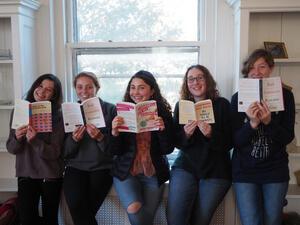Rising Voices Fellows Daring to be Themselves
JWA's Rising Voices Fellowship helps female-identified teens develop authentic voices, strengthen their leadership through writing, and begin to influence the important conversations of the Jewish community. Of course, these rockstars are already shaking things up in their communities today. This is Part Two of the Rising Voices in Action series, a month-long series that demonstrates the many different ways in which you can challenge the status quo, no matter your gender or age.
With so many issues and challenges facing the world today, it’s easy to believe that effecting change must happen on a large scale in order to make an impact. However, small actions can often make big waves, and for teenage girls, one of the most radical and brave things you can do is be yourself. In a world that actively encourages teens to conform, sit still, and stay silent, having the courage to be your authentic self is no small feat, and it can have a lasting impact on the surrounding culture.
The Rising Voices Fellows are showing us how small acts of resistance, like only shaving your legs when you feel like it, embracing your love of learning, being willing to practice (and fail), and singing as low and as high as you can, are all acts of everyday rebellion.
I’m sitting in English when I notice one girl staring at my legs, confused. She leans into her friend, who then turns her glare onto my legs too. The second girl then says something and the two look at me, horrified. “Yeah, I don’t always shave my legs,” I say to them. The idea that I would let my leg hair show seems to baffle some of the kids in my class. What is even more confusing, though, is that I sometimes do shave; I don’t fit the image of “overgrown hippie” that my classmates might expect from an outspoken feminist. I don’t think removing hair is inherently unfeminist. When I shave, I’m aware that I’m altering my appearance to meet societal beauty standards. However, I can’t always swim upstream against the mainstream; that’s exhausting! I’ve also been in situations where I am judged for shaving. Judging others based on the notion that there’s one correct way, whether it be shaving or leaving your legs lush, goes against the feminist ideals of opportunity, community, and acceptance. I try to evaluate my needs, shave when I want, and be thoughtful of the message I am sending.
When I was a little girl, I liked to imagine myself as Hermione Granger. Like my favorite “know-it-all” witch, I spent about half of middle school reading in the back of class, and the other half sitting up ramrod straight in my chair, hand stretched high into the air. I never had the best grades, but I took pride in having the most enthusiasm. By seventh grade, though, I started to notice that this attitude wasn’t the norm. But just as quickly as I realized that I was often the only one in class who was genuinely excited about learning, I realized that being “normal” just wasn’t that important to me. This attitude came naturally at the time, but it has become both more rewarding and more difficult to maintain in high school. When I email my favorite teacher an article about immigration, or take three pages of notes on the social commentary in Zootopia, my friends all accuse me of “sucking up” to my teachers, but the truth is that the more difficult school gets for me, the more determined I am to find joy in it. I raise my hand because I really do try hard, and I refuse to be embarrassed of that.
All my life I’ve been an alto in my school chorus. This year, however, I was asked to be a tenor because we don’t have many boys. Now it feels normal and I love being a tenor with the other two former altos, and of course, the boys. It was normal to me, until we did a concert with the other high school in my town. They were shocked when we told them we have girl tenors. In fact, they didn't think we would be any good because they assumed our ranges weren't as low as theirs. Once we started singing, they quickly changed their tune (no pun intended). While the boys struggled with the higher notes, us girls sailed through both the high and low notes. The boys were so surprised at our abilities, and it was awesome to prove to them that girls can sing just as low as them. It was challenging to go from an environment where it’s normal for girls to be tenors, to a place where it’s unheard of, but it was ultimately empowering because we educated others. I feel lucky that I was able to show those boys what girls can do, and break the tenor stereotypes.
Every day, I’m impressed by my classmates’ successes, from earning top grades to winning sports games. But being co-founder and vice president of Origami Club hasn’t helped me win anything. In fact, the reason I’m proud of my involvement in Origami Club is that it allows me to fail. In my college-applications-obsessed high school, most students avoid failure at all costs. Origami Club gives me an opportunity to struggle and try again, while beautifying my community. It all started when Grace and I met in sixth grade. I would watch in awe as she’d take a piece of paper, fold it, and just like that, it was a bird or turtle or butterfly. Soon she began teaching me. Our freshman year, Grace said she wished there was a way she could teach origami to others, and donate the creations to charity. Origami Club was born, and we donate everything we fold to local non-profit organizations. For example, we folded vases and flowers for a hospice center, a mobile for a preschool, and thousands of stars for Make-A-Wish Wisconsin’s winter gala. Every single week, I struggle with folding, often asking for help, and sometimes having to start over. Still, I smile the whole time.
Inspired by these reflections? You can check out RVF’s other blog posts. If you love the series and want to hear more about what these budding revolutionaries are doing, let us know and we can add you to our mailing list!
This piece was written as part of JWA’s Rising Voices Fellowship.











